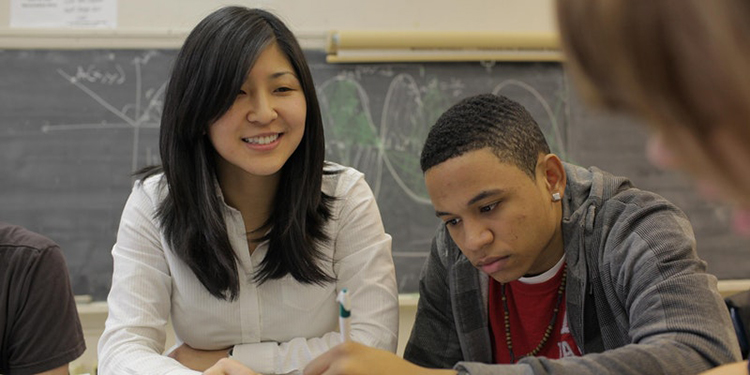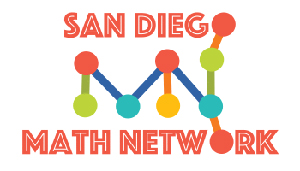
UC San Diego to Host Regional Education Leaders, Tackling Common Math Barrier to Student Success
Mini ‘igniter fund’ grants available to continue collaboration after symposium
Published Date
By:
- Anthony King
Share This:
Article Content

“Zeroing in on Intermediate Algebra/Integrated III: A Problem-Solving Symposium” is Aug. 11 at Kearny High School. Photo by San Diego Math Network
One of the biggest obstacles to student success after high school is intermediate algebra. The University of California San Diego is helping to tackle the challenge by organizing a wide group of regional education leaders to address what they call a “troubling impediment” to earning a four-year degree: Algebra II, often now taught as “Integrated III.”
“Intermediate algebra is the number one stumbling block for student success, and is also the ‘gatekeeper’ to college math courses,” said Susan Yonezawa, associate director of the UC San Diego Center for Research on Educational Equity, Assessment and Teaching Excellence, or CREATE, housed in the Division of Social Sciences. “Addressing this issue will help outcomes across all disciplines and education levels, from middle school to graduate school.”
Yonezawa is co-leading an effort through the San Diego Math Network, a collective of education leaders from the area’s four major school districts and UC San Diego, to undertake this issue, and many other aspects of the math “pipeline.” These efforts come at a particularly important time, she said, as educators and policymakers across California are re-thinking mathematics instruction and college requirements for the K-12 and California State University systems in particular.
“Zeroing in on Intermediate Algebra/Integrated III: A Problem-Solving Symposium” on Aug. 11 will bring together educators from dozens of K-12 schools, all 10 of the region’s community colleges, and the area’s four-year universities to develop new pathways for student success in math.
In addition to the San Diego Math Network, event sponsors include UC San Diego, the San Diego and Imperial Counties Community College Association, and San Diego Unified School District.
A recent NPR feature highlighted some alarming national statistics related to the problem: 60 percent of students enrolled in community colleges — a stepping-stone to a four-year degree for many young adults — are required to take at least one math course, often repeating what they already learned in high school. Nearly 80 percent of those fail to complete the requirement. Without it, they can’t earn an associate’s degree or move on to earn a bachelor’s.

“We feel the stress from this every day with our students and teachers, and we are excited a dedicated group of educators is committing to work on this roadblock to college success,” Yonezawa said.
The daylong symposium will provide a collaborative environment for colleagues from across the region to improve student achievement in intermediate algebra, leading to higher graduation rates overall. UC San Diego Chancellor Pradeep K. Khosla, San Diego Community College District Chancellor Constance Carroll and San Diego Unified School District Superintendent Cindy Marten will give welcome remarks.
Symposium attendees will:
- Review student data from high school, community college and four-year universities in order to define the problem at each level,
- Hold honest conversations about what techniques and approaches work,
- Learn about innovative projects and initiatives that are happening throughout the region,
- Participate in breakout sessions where instructors and educational leaders present successful models for intermediate algebra, and
- Brainstorm and develop next steps the region can take to work together toward student success.
To help spur action, a limited number of small grants, or “igniter funds,” will be made available by the San Diego Math Network, funded by the Bill & Melinda Gates Foundation, for cross-institutional teams to continue their work after the symposium ends.
“The igniter funds are a key component to the symposium because they will support people to follow up with people, learn further and collaborate after August 11,” said Mica Pollock, a professor in the UC San Diego Department of Education Studies, CREATE director and co-lead of both the San Diego Math Network and symposium with Yonezawa. “It is critical we continue the work beyond this event.”
The purpose of the San Diego Math Network is to connect educators and education leaders who are working to improve mathematics education for all students, through professional development and the sharing of collective resources, like the Aug. 11 symposium. The event is funded in part by a grant from the Bill & Melinda Gates Foundation.
“Zeroing in on Intermediate Algebra/Integrated III: A Problem-Solving Symposium” is Aug. 11, 8:30 a.m. – 4 p.m. at Kearny High School. Registration is free and open to a maximum of 300 participants. Follow @SDMathNetwork on Twitter to learn about this and other public events the San Diego Math Network hosts, and use #zerosd17 for updates on this specific symposium.
Share This:
You May Also Like
Stay in the Know
Keep up with all the latest from UC San Diego. Subscribe to the newsletter today.


